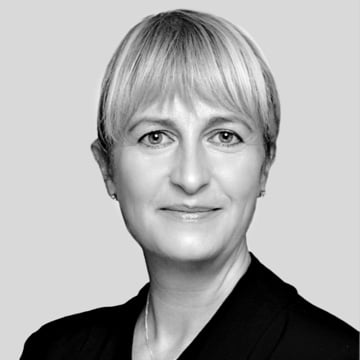About Us
We provide services that enable central government, healthcare, local government and public infrastructure organisations to digitally transform, allowing them to modernise their legacy technology, accelerate their digital service delivery and drive better decisions by using data.
We consistently deliver high-profile and complex projects at such speed that we now enjoy a strong reputation within the market and have developed long-term, sticky customer relationships.
Our board

Joanne Lake
Independent Non-Executive Chair
Joanne has over 30 years’ experience in accountancy and investment banking, including with Panmure Gordon, Evolution Securities, Williams de Broe and Price Waterhouse. She has over 10 years’ experience as a Non-executive Director, Senior Independent Director and Chair of a variety of publicly quoted companies. Joanne is a Chartered Accountant and a Fellow of the Chartered Institute for Securities & Investment, and of the ICAEW, and is a member of the ICAEW’s Corporate Finance Faculty.

Rory MacDonald
Founder and Chief Executive Officer
Rory is the Founder and Chief Executive at Made Tech Group. He has successfully built Made Tech Group into a highly regarded technology business known for its high quality services to clients. Rory is responsible for setting the strategic direction for the Group and for overseeing profitable growth.

Neil Elton
Chief Financial Officer
Neil has over 25 years’ experience in the strategic, operational and financial management of a number of fast growing listed companies.
Neil’s previous roles include CFO of Learning Technologies Group plc where he helped build the digital learning and talent management business to become a global leader in its market. Prior to that he was CFO of Science Group plc, the listed research and development specialist, and Concateno plc, the industry consolidator and European leader in drugs-of-abuse testing.
Neil is a Chartered Accountant with the ICAEW.

Chris Blackburn
Chief Operating Officer
Chris has over 20 years’ experience in digital and technology consulting roles spanning public and private sector clients including Royal Bank of Scotland, Philips, Government Digital Service and the Ministry of Justice. Prior to Made Tech, Chris was Technology Director at Dentsu Aegis agency Isobar, leading technology delivery in the UK.

Helen Gilder
Independent Non-Executive Director
Helen has over 30 years of experience in leading fast-growth digital technology companies. She was formerly CFO of AIM quoted ZOO Digital Group plc, is a member of the Yorkshire Regional Advisory Group of the London Stock Exchange and advises a number of growth businesses.
Helen is a Chartered Accountant with the ICAEW.

Stephen Lake
Independent Non-Executive Director
Stephen has over 30 years’ experience at senior executive and board level in leading digital, data, and tech growth businesses, across the quoted, public and private sectors, including Reuters, QinetiQ and Ordnance Survey. He was also a non-executive director of the Information and Digital Board of UK Parliament for six years.
Stephen is Chair of Vivedia and is a member of the ICAEW.
Senior management
Made Tech’s senior management team is comprised of three Executive
Directors from the Board and the following senior management.

Wayne Searle
Chief People Officer
Wayne is an international leader passionate about people, culture, communications and developing teams and organisations. Wayne’s successful global career spans multiple industries including telecoms, technology, automotive and ecommerce with leadership roles at Barclays, Vodafone, Criteo, Adevinta and more. Prior to Made Tech he led a human resources team across EMEA and globally for Mergers and Acquisitions at Vertiv.

Vicki Chauhan
Managing Director
Vicki has spent the last 26 years building, growing and leading businesses and teams that are focused on delivering consulting, engineering and managed services across the breadth of the Public Sector. Before Made Tech, Vicki grew and ran the public sector business at NTT DATA UK&I, having spent prior years leading and growing Public Sector business for BAE Systems Applied Intelligence, Detica and BT Syntegra.
Corporate governance & responsibilities
AIM-quoted companies are required to adopt a recognised corporate governance code with effect from their admission to trading on AIM however, there is no prescribed corporate governance regime for AIM companies. The QCA has published the Quoted Companies Alliance’s Corporate Governance Code (the “QCA Code”), a set of corporate governance guidelines, which include a code of best practice, comprising principles intended as a minimum standard, and recommendations for reporting corporate governance matters. The Directors acknowledge the importance of high standards of corporate governance and intend, given the Company’s size, board structure, stage of development and resources, to comply with the QCA Code.
The Board comprises six Directors, of which three are Executive Directors and three are Non-Executive Directors. The Board considers Joanne Lake, Helen Gilder and Stephen Lake to be independent Non-Executive Directors under the criteria identified in the QCA Code.
The Company holds regular board meetings and the Directors are responsible for formulating, reviewing and approving the Company’s strategy, budget and major items of capital expenditure. The Directors have established an audit committee, a nomination committee and a remuneration committee with formally delegated rules and responsibilities.
Audit and Risk Committee
The Audit & Risk Committee comprises Joanne Lake, Stephen Lake and Helen Gilder, who acts as Chair. The Audit & Risk Committee determines and examines matters relating to the financial affairs of the Company including the terms of engagement of the Company’s auditors and, in consultation with the auditors, the scope of the audit. It receives and reviews reports from management and the Company’s auditors relating to the half yearly and annual accounts and the accounting and internal control systems in use throughout the Company. The Report of the Audit & Risk Committee can be found on pages 48 to 50 of the Annual Report.
Remuneration Committee
The Remuneration Committee comprises Joanne Lake, Helen Gilder and Stephen Lake, who acts as Chair. The Remuneration Committee reviews and makes recommendations in respect of the Executive Directors’ remuneration and benefits packages, including share options and the terms of their appointment. The Remuneration Committee also makes recommendations to the board concerning the allocation of share options to employees under the New Share Plans. The Report of the Remuneration Committee can be found on page 42 of the Annual Report.
Nomination Committee
The Nomination Committee comprises Helen Gilder, Stephen Lake and Joanne Lake, who acts as Chair. The Nomination Committee is responsible for identifying and nominating for board approval candidates to fill board vacancies and evaluating the need for and nature of additional appointments.
Environmental, Social and Corporate Governance (ESG) Committee
The ESG Committee comprises employees elected by Made Tech staff.
The ESG Committee is responsible for advising and challenging the Executive Team on the strategy and activities to fulfil the Group’s objectives on sustainability, generating social value through its work, positively impacting the lives of its employees and stakeholders, and operating ethically and with goodwill. The ESG Committee updates the board on the Group’s progress to achieving its social value objectives on an bi-annual basis.
The Report of the ESG Committee can be found on pages 22 to 28 of the Annual Report.
This information was last reviewed on 21 October 2024.
Establish a strategy and business model which promote long-term value for shareholders
Made Tech is a provider of digital, data and technology services to the UK public sector. Founded in 2008 and with staff based in four ‘hub’ locations across the UK (London, Manchester, Bristol and Swansea), Made Tech provides services that enable central government, healthcare, local government and public infrastructure organisations to digitally transform.
The Group’s strategy is to provide software and services to run and improve public services worldwide. We will create value for our shareholders through organic growth and targeted M&A activity. By focusing on organic growth, we aim to leverage our existing capabilities, deepen our relationships with clients, and expand our market share in a sustainable manner. Concurrently, our M&A strategy is designed to accelerate growth by acquiring companies that offer complementary products or market access. This dual approach ensures that we scale efficiently while maintaining a strong foundation of service excellence.
Further details of our growth strategy can be found on page 12 of the Annual Report.
Seek to understand and meet shareholder needs and expectations
The board is committed to open and ongoing engagement with the Company’s shareholders to understand their needs and expectations and to ensure that the Company’s business model, strategy and performance are explained and understandable.
Regular communication with shareholders centres around the Annual and Interim Reports, the full and half year results announcements and trading updates (where required or appropriate) as well as the Company’s website, which provides access to financial reports, announcements and notifications made via a Regulatory Information Service.
Our Chief Executive Officer is the primary point of contact for shareholders. We have a dedicated email address, investor-relations@madetech.com, for shareholder questions and comments. The Chief Executive Officer is responsible for ensuring that all such feedback from investors is reported to the board as a whole.
Regular meetings are held between the Chief Executive Officer, the Chief Financial Officer and investors and analysts to ensure that the Company’s strategy, financials and business developments are communicated effectively. The Independent Non-Executive Directors are also available to discuss any matters that shareholders wish to raise and discuss.
The board also seeks to use the Annual General Meeting to communicate with shareholders, and to give them the opportunity to ask questions and present their views to the whole board.
Take into account wider stakeholder and social responsibilities and their implications for long term success
The board recognises that execution of the Company’s strategy depends upon strong relationships with both its internal and external stakeholders, and it therefore seeks to understand stakeholder expectations and how they align with the needs of the business. The board will be regularly updated on feedback from stakeholder engagement to ensure that it has a full understanding of the issues that matter most to them so that they can be taken into account in the board’s decision making.
Employees
The Company is committed to conducting business with integrity, honesty and fairness and operates a Code of Conduct for all of its employees to ensure that everyone is acting in the best interests of the business.
The board is committed to creating a climate of openness throughout the Company, and to encouraging its employees to provide their feedback through regular employee engagement initiatives and to contribute their own ideas through regular meetings between staff representatives and senior management. The Company uses a variety of channels to keep staff informed of key developments. The Company will continue to provide its employees with regular briefings and updates as well as providing visibility of the Group’s financial performance and future plans.
The Company is committed to developing all members of staff, enabling them to fulfil their potential by providing learning and development pathways and career support to all staff across the business, from apprentices to senior management. The Company’s academy programme attracts recruits from diverse backgrounds looking to start their careers in the IT and technology sector. Where appropriate, before searching for external candidates, job vacancies are advertised internally within the Company. The Company also supports employees who seek to acquire professional qualifications or to further their own development.
Suppliers
The Company’s supplier relationships are managed effectively by our managers to ensure that there is no disruption to the Company’s supply chain that could have an adverse impact on the business.
The Company is committed to the ethical sourcing of products and only contracts with suppliers that it believes respect the rights of their employees and require the same standards from all of their suppliers that they apply in their own business.
Clients
All Made Tech clients have a dedicated Client Lead responsible for managing the client relationship. There is a dedicated team including an Executive Sponsor, Industry Lead, Client Partner, Technical Lead and Delivery Lead to support clients and ensure that we develop the relationship and provide great work to grow our relationship and grow the size of the accounts. Client feedback is regularly communicated back to the Executive Team to enable the Company to improve current and future product development, marketing support and customer service levels.
Community and Environment
The core focus of the Made Tech business is summed up as “enabling public sector services to digitally transform to provide better services and levels of care and assistance to our communities in a safe, efficient and responsible manner”.
The Company aims to challenge itself to develop smarter ideas and to continually improve its technology to enable its clients to meet both business and sustainability goals.
Made Tech complies with the Waste Electrical and Electronic Equipment Regulations and works in compliance with the Restriction of the Use of Certain Hazardous Substances in Electrical and Electronic Equipment Regulations 2004. The Group continues to find ways to reduce energy consumption, reduce waste and increase recycling.
Further details of our work with stakeholders is provided in the Social Value Report on pages 22 to 28 of the Annual Report.
Embed effective risk management, considering both opportunities and threats, throughout the organisation
The Directors are responsible for maintaining the Company’s systems of controls and risk management in order to safeguard the Company’s assets.
Made Tech operates a risk management framework to identify, manage and monitor risks which affect the delivery of its business model. Risk is a standing item on the board’s agenda with reports provided by the Group’s senior leadership team. In conjunction with these reports, the board assesses the effectiveness of internal control systems designed to safeguard the business, by monitoring financial performance against budgets and updated financial forecasts. A formal review of risk and our risk management strategy can be found on pages 29 to 33 of the Annual Report.
Maintain the board as a well-functioning, balanced team led by the chair
The Company’s board of Directors comprises three Executive Directors and three Non‑Executive Directors. The QCA Code recommends that at least two board members should be Non-Executive Directors who are independent. The Non-Executive Directors are considered independent for the purposes of the QCA Code and accordingly the Company complies with its requirements.
The biographies of the Directors can be found on pages 34 to 35 of the Annual Report and in the board of Directors section of the website. The board is assisted in its duties by the Audit & Risk, Remuneration and Nominations Committees, further information on which can be found on pages 51 and 52 of the Annual Report and on the website under a section titled Corporate Governance.
The Executive Directors work full time in the business and have no other significant outside business interests. The CEO is responsible for managing the Group’s business and operations within the parameters set by the board. The Non-Executive Directors are responsible for bringing independent judgement to the discussions held by the board, using their breadth of experience and understanding of the business. Their key responsibilities are to constructively challenge and contribute to strategic proposals, and to monitor performance, resources and standards of conduct, compliance and control, whilst providing support to executive management in developing the Group. Their time commitment is sufficient for them to perform these responsibilities and details of their external commitments are given alongside their biographies on pages 34 to 35 of the Annual Report.
The board is satisfied that it has a suitable balance between independence and knowledge of the business to allow it to discharge its duties and responsibilities effectively.
The board expects to meet at least eight times a year with additional meetings when circumstances and urgent business dictate, and will be responsible for strategy, oversight of the Company’s activities and reviewing the framework of internal controls.
Briefing papers are distributed to all Directors in advance of board and Committee meetings and all Directors have access to the advice and services of the Company Secretary, who is responsible for ensuring that board procedures are followed, that each Director is at all times provided with such information as is necessary for them to discharge their duties and that applicable rules and regulations are followed, in accordance with the QCA Code.
Attendance information on Group board meetings can be found in the board of Directors section on page 34 of the Annual Report.
Attendance information on Committee meetings can be found in the Remuneration Report on page 44 and the Audit & Risk Committee Report on page 48 of the Annual Report.
Ensure that between them the directors have the necessary up-to-date experience, skills and capabilities
Information on each board member including their experience, skills and qualities they bring to the board is set out on pages 34 to 35 of the Annual Report and on the website under board of Directors.
The Directors are satisfied that the balance of Executive and Non-Executive Directors is appropriate and that no individual or group may dominate the board’s decisions. The board considers that each of the Directors has the experience and knowledge to constructively challenge the Group’s strategy and to provide the necessary guidance, oversight and advice to enable the board to operate effectively. The Group believes that the current balance of skills in the board as a whole reflects a very broad range of commercial and professional skills. The Chair and other Non‑Executive Directors communicate with each other as necessary and meet, informally, without the presence of the Executive Directors from time to time during the year. Additionally, they each maintain ongoing communications with Executives between formal board meetings.
In addition to their general board responsibilities, Non-Executive Directors are encouraged to participate in other Group meetings or in matters when their individual areas of expertise may be of value.
The Company Secretary ensures that all Directors are kept abreast of changes in relevant legislation and regulations, with the assistance of the Company’s other advisers where relevant, as well as helping the Chair to maintain excellent standards of corporate governance.
The Executive Directors are subject to the Company’s performance and development review process through which their performance against predetermined objectives is reviewed and their personal and professional development needs are considered. The Directors are encouraged to raise any personal development or training needs with the Chair.
The Non-Executive Directors have a breadth and depth of skills and experience across many different sectors enabling them to provide the necessary guidance, oversight and advice for the board to operate effectively.
In order to keep Director skill-sets up to date, the board uses third parties to advise the Directors of their responsibilities including receiving advice from the Company’s external lawyers and Nominated Adviser. Board composition is always a consideration in relation to succession planning. The board will consider any board imbalances for future nominations, including board independence and gender balance.
Evaluate board performance based on clear and relevant objectives, seeking continuous improvement
All board appointments are made after consultation and detailed due diligence is carried out. The board will consider using external advisers to review and evaluate the effectiveness of the board and Directors in future to supplement its own internal evaluation processes.
In May 2023, the board performed an internal formal evaluation of its performance in its first full year as a listed company. The review comprised:
- the completion of a comprehensive questionnaire by all board members covering the effectiveness of the board performance as a unit, as well as that of its Committees and the individual Directors. This covered assessment against both “Composition and Process” criteria and “Behaviours and Activities” criteria; and
- a board discussion facilitated by the Non-Executive Chair of the outputs of the questionnaire.
These results are being used as a benchmark for the board and will be reviewed again on a regular basis. The process identified some areas for development and recommendations to be progressed in FY24 and FY25, including in the context of the Group’s growth ambitions, adopting a longer-term outlook to the consideration of, and detailed planning around, future board size and composition, and mix of skills, experience, knowledge and diversity of the board.
Promote a corporate culture that is based on ethical values and behaviours
The board is mindful that the tone and culture set by the board will impact many aspects of the Company and the way that stakeholders behave and form views.
The Company recognises the importance of establishing a culture of ethical behaviour and applies these standards to all dealings with employees, clients and other stakeholders. Accordingly, Made Tech has developed an ethics policy to ensure that its business is conducted with high ethical and legal principles and sets standards of professionalism and integrity for all employees and Group-wide operations.
The board has adopted an Anti-Bribery and Corruption Policy consistent with the requirements of the UK Bribery Act 2010 and Modern Slavery Policy. Compliance with the policy will be regularly reviewed at board meetings.
Maintain governance structures and processes that are fit for purpose and support good decision-making by the board
The board of Directors is responsible for the determination of the investment decisions of the Company and for its overall supervision and the objectives it has set out. The board is also responsible for the Company’s day-to-day operations.
The Company has established Remuneration, Audit & Risk, Nomination and ESG Committees. Further details are set out above.
The Chair is responsible for leading an effective board, fostering a good corporate governance culture, maintaining open communications with the major shareholders and ensuring appropriate strategic focus and direction.
The Chief Executive Officer has overall responsibility for managing the day-to-day operations of the Company and the board as a whole is responsible for implementing the Company’s strategy.
Communicate how the Company is governed and is performing by maintaining a dialogue with shareholders and other relevant stakeholders
The board is committed to maintaining effective communication and having constructive dialogue with its shareholders.
The Company has established and intends to build ongoing relationships with both its private and institutional shareholders (through meetings and presentations) as well as institutional analysts, and for them to have the opportunity to discuss issues and provide feedback at meetings with the Company. The Company communicates progress with shareholders and stakeholders throughout the year by publishing announcements via a Regulatory Information Service and its Annual and Interim Report and Accounts (including the Section 172 Statement), and through update meetings as necessary.
The Group’s website is kept up to date with appropriate governance material, and contains details of relevant developments, press and corporate news and presentations.
Advisers & registrars
Nominated Adviser
Singer Capital Markets Advisory LLP
One Bartholomew Lane
London
EC2N 2AX
Broker
Singer Capital Markets Securities Limited
One Bartholomew Lane
London
EC2N 2AX
Legal advisers to the Company
Fieldfisher LLP
No. 1 Spinningfields
1 Hardman Street
Manchester
M3 3EB
Auditor and Reporting Accountant
Crowe U.K. LLP
55 Ludgate Hill
London
EC4M 7JW
Financial PR and IR Advisers
Rawlings Financial PR Limited
43 Manchester Street
London
W1U 7LP
Registrars
Link Group
6th Floor
65 Gresham Street
London
EC2V 7NQ





